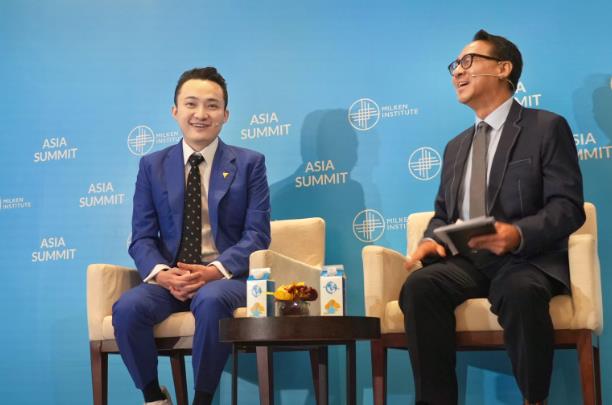In a recent event, Justin Sun, the founder of TRON and a member of the HTX Global Advisory Committee, was a prominent figure at the 2023 Milken Institute Asia Summit held on September 14. During this event, Sun had an in-depth conversation with Kirk Wagar, the President of Wagar Global Advisors and Former Ambassador of the US to Singapore. The discussion revolved around the future direction of the cryptocurrency industry.
Justin Sun emphasized the under-recognition of stablecoins as a significant real-world application. He pointed out the vast potential of cryptocurrency and blockchain technology in transforming global settlement and payment systems. Using TRON as an example, Sun mentioned that the blockchain currently holds around $50 billion in stablecoins, including well-known ones like USDT, USDC, TUSD, and decentralized stablecoins such as USDD and USDJ. Impressively, the TRON network has a daily trading volume exceeding $12 billion, which surpasses many other platforms trading in US dollars, all while maintaining much lower transaction fees.
Kirk Wagar brought up the ongoing market concerns about cryptocurrencies. In response, Sun believes that the solution to these trust issues lies in enhancing transparency and promoting decentralization. He stated, “The primary way to address these doubts is by increasing transparency. It’s crucial for regulators because they need to maintain records and ensure everything is in order.”
Furthermore, Sun highlighted the importance of decentralization, drawing parallels with Bitcoin BTC -1.46%’s design principles. He emphasized the lack of a single controlling entity in Bitcoin transactions, stressing the significance of decentralized governance in establishing a global financial consensus. As the founder of TRON, Sun remains committed to decentralization, aligning with other major public chains like Ethereum ETH -0.51% and Solana SOL -1.96%. TRON operates based on thousands of global nodes, ensuring transparency and decentralization, which in turn builds trust with regulatory agencies.
During their conversation, Sun also touched upon Asia’s rising influence in the crypto world. He noted that the crypto industry originated in Asia and has expanded from China to other influential regions like Singapore, South Korea, Japan, and Hong Kong. With the US Securities and Exchange Commission’s actions, many leading US investment institutions have shifted their focus to Asia. Sun believes that using Asia as a central battleground for advancing crypto technology can lead to a broader range of use cases and provide better regulatory clarity, benefiting the crypto industry’s development in the US.
Sharing his experience from his time at the World Trade Organization (WTO), Sun mentioned that while the WTO mainly focuses on traditional trade, there’s still no consensus on e-commerce and blockchain. However, he firmly believes that blockchain offers an affordable solution to provide financial services to underserved areas like Africa. He sees an increasing number of people adopting crypto technology for daily transactions, using networks like TRON. While promoting widespread crypto adoption will take time, Sun is optimistic about the industry’s direction, expecting mainstream applications within the next 5 to 10 years.






